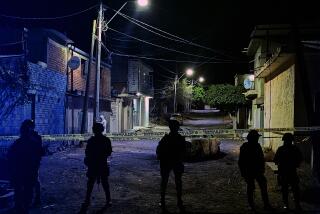Colombia rejects U.S. extradition request
Colombia’s Supreme Court has blocked the extradition to the United States of a notorious former paramilitary leader and alleged drug trafficker arrested last year, citing the importance of his testimony in bringing justice to victims of decades of violence in the South American country.
Daniel Rendon Herrera, known as Don Mario, has been indicted in the Southern District of New York federal court on charges of smuggling 100 tons of cocaine. But Rendon, 44, is cooperating with authorities in Colombia investigating mass killings and forced displacements of thousands of poor farmers, a factor cited by the court Wednesday in barring extradition.
Until recently, the court had raised little objection to hundreds of extraditions of drug and terrorism suspects authorized by President Alvaro Uribe since he took office in 2002.
But combined with its refusal in February to authorize the extradition of ex-paramilitary capo Edwar Cobos Tellez, the court’s ruling is a reversal of policy, said Colombian human rights advocate Ivan Cepeda.
Though the extraditions, a cornerstone of Uribe’s war on terrorism and drugs, have helped bring convictions in U.S. courts, they weakened many investigations of thousands of slayings in Colombia. In many cases, they also deprived victims’ families of information on the whereabouts of the bodies of loved ones, Cepeda and others say.
Captured last April after a nine-month manhunt, Rendon was a feared paramilitary leader who declined to participate in Uribe’s 2003 demobilization offer to militia leaders and 31,000 fighters. Instead, he continued to traffic in cocaine, forming his own band called the Urabenos, officials said.
In the months before his capture, scores of paid assassins under Rendon’s control killed an estimated 3,000 people in a bloody struggle for power focused on the drug trafficking routes in Colombia’s northwest, the National Police commander, Gen. Oscar Naranjo, told reporters.
In its ruling this week, the Supreme Court said that the claims of Colombian justice, including charges that Rendon committed mass murder and other crimes against humanity, take precedence over the U.S. legal process.
Cepeda said the court’s view of extraditions has turned negative in recent months because previously extradited suspects typically stop cooperating in Colombian cases once they leave the country, contrary to promises made by Colombian and U.S. authorities.
“This strengthens the view that without Colombian justice first, there can’t be extraditions,” said Cepeda, who is director of the National Movement of Victims of State Crimes.
Human rights groups have protested many of the extraditions authorized by Uribe, particularly the transfer of 14 high-ranking paramilitary leaders in May 2008, saying they should have stayed in Colombia to contribute to the investigation of homicide, terrorism and drugs cases.
“The families have been applying a lot of pressure on the government, saying that with the extradition of these leaders, the crimes have gone unpunished,” said Carlos Eduardo Jaramillo, a former diplomat and security advisor. “So the recent rulings are a new trend for the court.”
The ruling comes amid renewed concern over paramilitarism in Colombia. In elections Sunday, several candidates who won seats in Congress have familial or other links to politicians who are either in jail or under investigation for suspected ties to right-wing paramilitary groups.
Kraul is a special correspondent.
More to Read
Sign up for Essential California
The most important California stories and recommendations in your inbox every morning.
You may occasionally receive promotional content from the Los Angeles Times.








